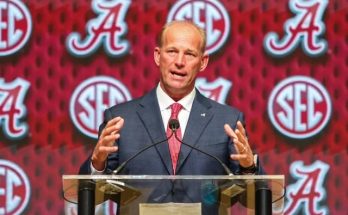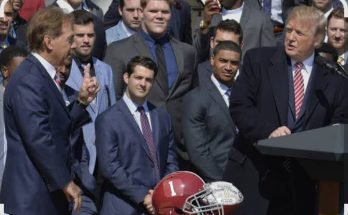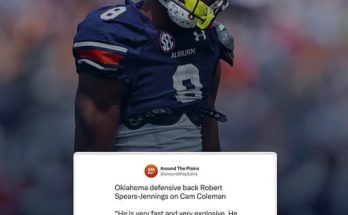When Marcus Freeman took over as head coach of the Notre Dame Fighting Irish, he inherited a program steeped in tradition, pride, and a history of iconic rivalries that have helped shape college football for decades. But as much as he respects the past, Freeman also has a vision for the future — one that involves creating fresh, compelling matchups that excite fans, challenge his team, and elevate Notre Dame’s standing in the national landscape. Recently, Freeman revealed the one team he truly wants Notre Dame to play every year, and it offers a fascinating glimpse into how the Irish plan to keep growing their program’s legacy while adapting to the modern college football era.
To fully understand why Freeman has singled out this particular opponent, it’s important to recognize the broader context of Notre Dame’s scheduling philosophy. Traditionally, Notre Dame’s football schedule has been a mix of long-established rivalries — like those against USC and Navy — as well as independent scheduling flexibility that allows the Irish to seek marquee non-conference matchups. This has enabled Notre Dame to maintain national relevance despite not being affiliated with a conference for football. However, the college football world has shifted dramatically over the last decade, especially with the emergence of the College Football Playoff, conference realignments, and a more competitive recruiting landscape. In this evolving environment, securing consistent high-level opponents every season is more crucial than ever.
For Marcus Freeman, the answer lies in forging a rivalry with a program that combines competitive excellence, national prominence, and a shared commitment to tradition and high standards. According to Freeman, that team is none other than the University of Michigan Wolverines.
Why Michigan? The choice might not be surprising to many college football observers who know the rich history between the two programs, but Freeman’s emphasis on this matchup goes beyond nostalgia. He sees Michigan as an ideal partner for Notre Dame because both teams have loyal fanbases, rich traditions, and the capacity to produce thrilling, high-stakes contests that can capture national attention year after year.
The Notre Dame-Michigan relationship has featured memorable clashes in the past, with historic games dating back to the early 1900s. Their rivalry, although not continuous over the years, has been filled with moments of drama, heart-stopping finishes, and iconic performances by legendary players and coaches on both sides. These games have often been highlighted on national broadcasts and featured as key matchups in the college football season. For Freeman, reviving this series on a consistent, annual basis would not only honor that legacy but also create a marquee event that the program’s fans and players can rally around.
One of the reasons Freeman is so passionate about this matchup is the high level of competition that both Notre Dame and Michigan bring to the field. Both programs consistently recruit elite talent and have histories of success, competing for conference titles, major bowl games, and playoff appearances. The competitiveness ensures that the games will be fiercely contested, providing players with the kind of intense, meaningful challenges that help them grow and prepare for professional careers.
Moreover, from a fan perspective, an annual Notre Dame-Michigan game would deliver compelling storylines and high drama. Both schools boast passionate fanbases that stretch across the country, and the blend of Midwest grit with East Coast and national prominence creates a unique cultural and athletic matchup. The rivalry games generate electric atmospheres both in the stadium and across media platforms, which is crucial in today’s saturated sports environment where capturing viewer attention is a constant battle.
Freeman also points to the logistical and scheduling advantages of a Notre Dame-Michigan annual game. With conference schedules often limiting non-conference flexibility, securing a dependable, high-caliber non-conference opponent is increasingly valuable for an independent program like Notre Dame. Michigan, as a Big Ten powerhouse, offers a consistent source of elite competition outside of conference play, while helping Notre Dame maintain a strong strength of schedule — a key factor in playoff and ranking considerations.
There is also a strategic recruiting component to this desire. Playing Michigan every year puts Notre Dame regularly in front of recruits in the Midwest, an important recruiting hotbed for the Irish. Having a high-profile matchup on the schedule increases Notre Dame’s visibility and appeal in that region, allowing coaches to build stronger relationships with local talent and their families. It also gives recruits a taste of what it’s like to compete at the highest level against a storied program, enhancing Notre Dame’s attractiveness as a destination for top prospects.
Freeman’s vision for an annual Notre Dame-Michigan game aligns with the broader evolution of college football, where traditional rivalries are being renewed or newly formed to meet the demands of a more competitive and commercialized sport. With conference realignments disrupting some historic rivalries and changing the landscape of college football, marquee non-conference games have become an essential way for programs to maintain national relevance and drive fan engagement.
However, making this vision a reality requires coordination and compromise. Both Notre Dame and Michigan have demanding schedules, including conference commitments and other rivalry games. Establishing a permanent, annual series would mean carefully balancing these commitments while also considering financial and logistical factors like travel, television contracts, and fan attendance. It’s a complex process, but Freeman’s enthusiasm signals that Notre Dame is willing to pursue the necessary conversations and negotiations to bring this dream matchup to life.
Freeman’s passion for this rivalry reflects his broader coaching philosophy — one that emphasizes building a strong, resilient team capable of competing at the highest level while honoring the program’s rich heritage. He recognizes that having a consistent, challenging opponent each year helps develop the competitive edge and mental toughness required for postseason success. It also helps cultivate a culture of excellence within the program, where players, coaches, and fans alike understand that each season includes a defining challenge against a worthy adversary.
As Notre Dame continues to position itself for sustained success under Freeman’s leadership, the prospect of playing Michigan every year offers a tantalizing glimpse of what college football fans can look forward to: a clash of titans, steeped in tradition yet brimming with modern intensity, that captures the essence of what makes the sport so compelling.
In the end, Marcus Freeman’s dream is more than just about one opponent. It’s about elevating Notre Dame’s football program to new heights, creating a tradition that future generations of players and fans can cherish, and ensuring that every season includes a game that tests the team’s mettle and ignites passion across the fanbase. Whether or not the Notre Dame-Michigan matchup becomes an annual staple, Freeman’s vision highlights the importance of rivalries in college football’s past, present, and future — and the role they play in shaping a program’s identity.
As the Fighting Irish prepare for upcoming seasons, all eyes will be on how Freeman’s vision unfolds. For now, fans can dream alongside their head coach, imagining a future where Notre Dame and Michigan meet every fall in a battle that honors history, challenges excellence, and electrifies the college football world.



